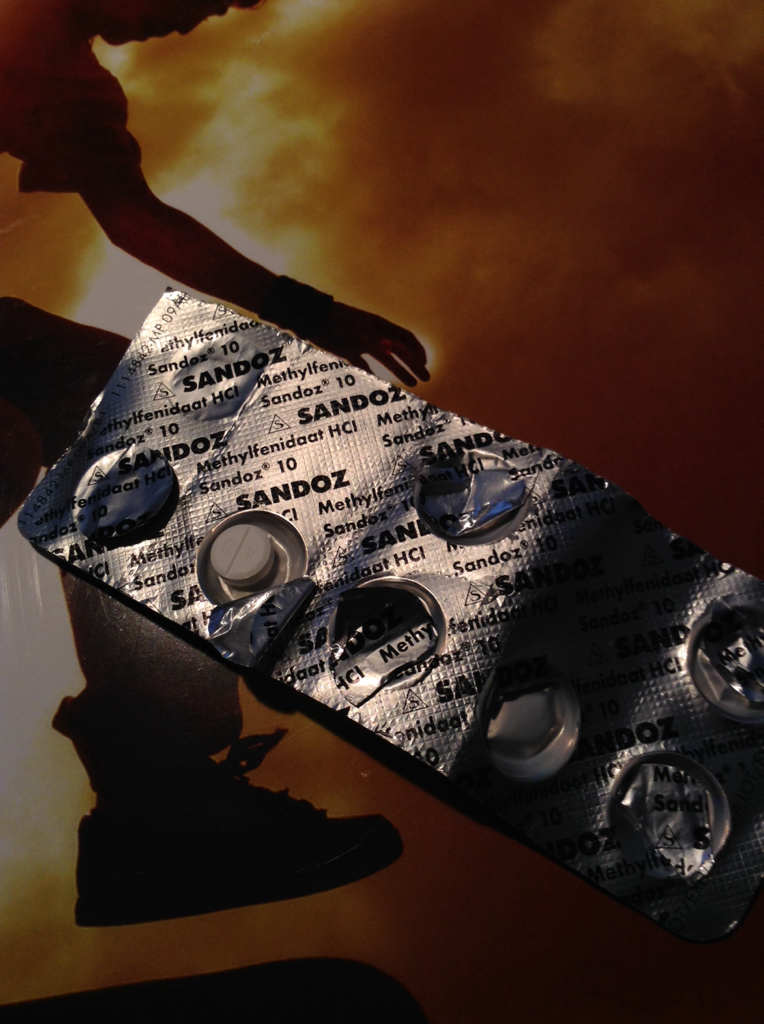Methylphenidate: Difference between revisions
m |
m |
||
| (One intermediate revision by one other user not shown) | |||
| Line 1: | Line 1: | ||
[[File:Methylphenidate.png|thumb|300px|Blister packed Methylphenidate pills]] | [[File:Methylphenidate.png|thumb|300px|Blister packed Methylphenidate pills]] | ||
'''Methylphenidate''' (also known as Ritalin, Concerta | '''Methylphenidate''' (also known as Ritalin, Concerta, Medikinet and Tranquilyn) is a [[stimulants|stimulant]] which is commonly prescribed as treatment of AD(H)D outside of the USA, instead of [[Adderall|Amphetamine]]s. | ||
== History == | == History == | ||
| Line 11: | Line 11: | ||
It was researched as a treatment option for ADD during its initial inception as a medically accepted condition, and has been available on a prescription-basis for this purpose since. | It was researched as a treatment option for ADD during its initial inception as a medically accepted condition, and has been available on a prescription-basis for this purpose since. | ||
Today methylphenidate is available in instant release and extended release form and also as transdermal patch (Daytrana). | Today methylphenidate is available in instant release (Ritalin) and extended release (Concerta) form and also as transdermal patch (Daytrana). | ||
== Usage == | == Usage == | ||
Latest revision as of 17:47, 19 October 2017

Methylphenidate (also known as Ritalin, Concerta, Medikinet and Tranquilyn) is a stimulant which is commonly prescribed as treatment of AD(H)D outside of the USA, instead of Amphetamines.
History
Methylphenidate was first synthesised by the Ciba Pharmaceutical Company in 1944, and after human testing which began in 1954 it first became available in 1957 under the brand name 'Ritalin' - marketed as a treatment for several conditions including chronic fatigue, depression and narcolepsy.
In the 1960s it was popularly used to reverse the effects of a barbiturate overdose, meanwhile also being sold in combination with other substances in 'health tonics' - the most notable of which being 'Ritonic.'
It was researched as a treatment option for ADD during its initial inception as a medically accepted condition, and has been available on a prescription-basis for this purpose since.
Today methylphenidate is available in instant release (Ritalin) and extended release (Concerta) form and also as transdermal patch (Daytrana).
Usage
As mentioned above, Methylphenidate is in wide use worldwide for the treatment of ADHD - along with Adderall it is one of the most commonly prescribed chemicals.
The drug is also widely used off-prescription, by users seeking euphoria or surplus energy and concentration. Similar to Adderall It is commonly used by students at exam-times or for other study, often sold at a premium by colleagues with prescriptions.
Dosage
{{#tdose: methylphenidate }}
Duration
Note: Duration can be significantly longer with higher doses.
| Onset | 30-120 Minutes |
| Total | 4-6 hours |
| Onset | 5-15 Minutes |
| Total | 2-5 Hours |
Effects
Note: The prevalence of negative effects increases with higher doses.
Positive
- Increased alertness
- Euphoria
- Increased motivation
- Abundance of energy
Neutral
- Reduced appetite
- Flushing of the face
Negative
- Increased body temperature
- Tachycardia (increased heart rate)
- Hypertension (High blood pressure)
- Dehydration
- Paranoia
- Racing thoughts
- Insomnia
Harm Reduction
- Abuse or binging on Methylphenidate can lead to heavy comedown effects which can, in extreme cases, result in psychosis. Get some sleep every night, and see Quick Guide To Stimulant Comedowns for more infromation.
- Methylphenidate has been shown to be habit-forming, take care with repeated use.
- Coingestion of alcohol (ethanol) also increases the blood plasma levels of d-methylphenidate by up to 40%.
As with all stimulants, remain hydrated and stay healthy. See Stimulant Harm Reduction for more information.
Interactions
See the Drug combinations chart for more information.
Chemistry and Pharmacology
Methylphenidate primarily acts as a dopamine-norepinephrine reuptake inhibitor (NDRI) and also as a sigma-1 receptor agonist.
Four isomers of methylphenidate are known to exist. One pair of threo isomers and one pair of erythro are distinguished, from which only d-threo-methylphenidate exhibits the pharmacologically usually desired effects.
The dextrorotary enantiomers are significantly more potent than the levorotary enantiomers, and some medications therefore only contain dexmethylphenidate (such as Focalin).
Methylphenidate taken orally has a bioavailability of 11–52%. The half-life of methylphenidate is 2–3 hours, depending on the individual. The peak plasma time is achieved at about 2 hours.
LD50
The LD50 of methylphenidate in rats is 190mg/kg. In humans it is estimated to be 250mg+ for a 75kg (130lb) person.
Legal status
- In Australia, methylphenidate is a 'Schedule 8' controlled substance. IT must be kept in a lockable safe before being handed out and is illegal to possess without a prescription.
- In Canada, methylphenidate is listed as schedule III under the Controlled Drugs and Substances Act. It is illegal to possess without a prescription.
- In New Zealand, methylphenidate is a 'class B2 Controlled Substance'.
- In the United Kingdom, methylphenidate is a controlled 'Class B' Substance. Possession without a prescription is illegal.
- In the United States, methylphenidate is classified as a Schedule II Controlled Substance. Possession without a presciption is illegal.
- In Sweden, methylphenidate is a List II controlled substance. Possession without a prescription is illegal.